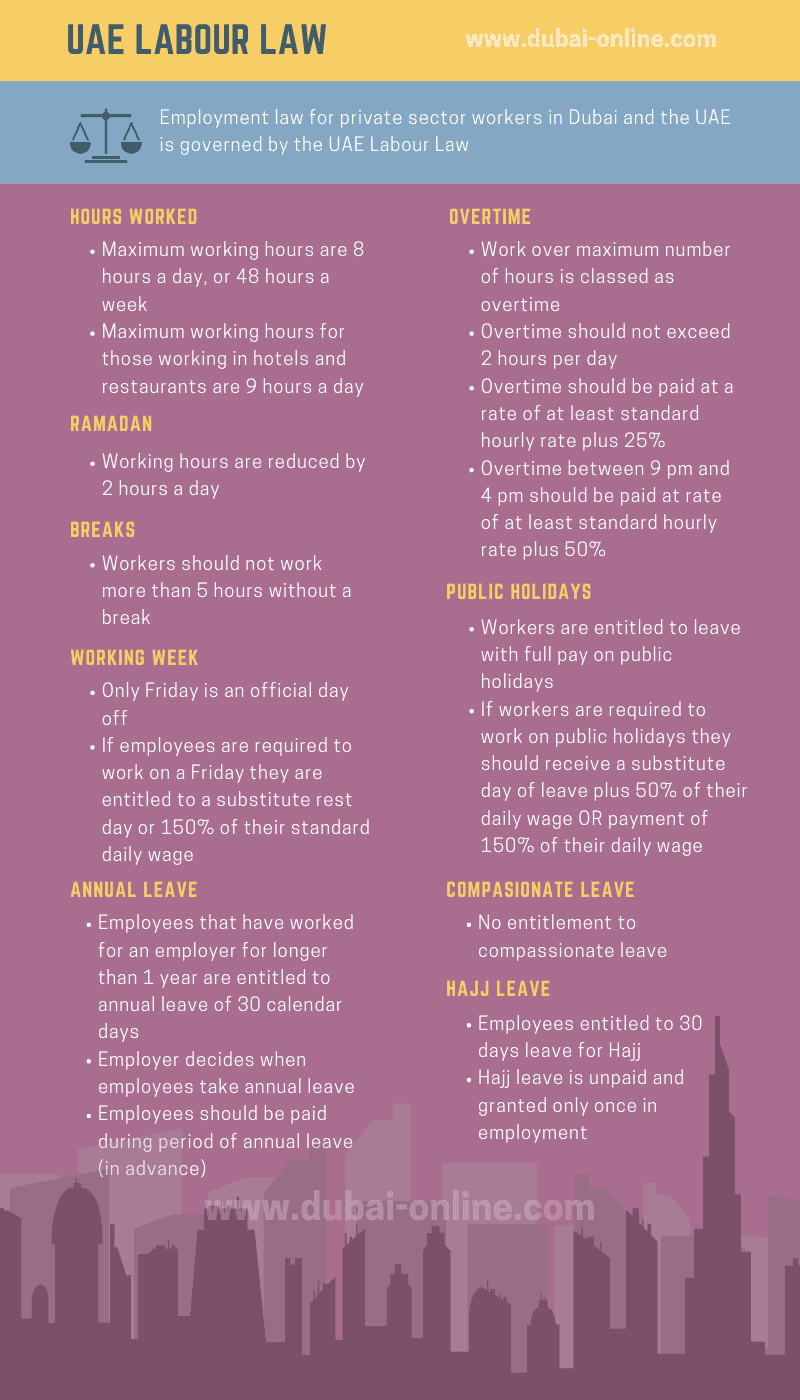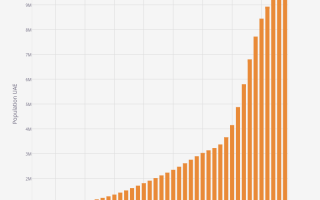The main source of employment law in Dubai and the United Arab Emirates (UAE) is Federal Law No 8. of 1980 (the ‘UAE Labour Law”).
The UAE Labour Law applies to all employees in the UAE except government and municipal workers, army/police, domestic servants, and agricultural workers.
Different laws also apply to financial free zones such as the Dubai International Financial Centre (DIFC) and Abu Dhabi Global Market (ADGM). These areas have their own employment laws.
It should also be noted that the provisions of the UAE Labour Law in respect of working hours and overtime do not apply to workers in high level managerial/supervisory positions (Article 72).
According to Article 65 of the UAE Labour Law the maximum working hours in Dubai and the UAE is eight hours per day or 48 hours per week. The maximum for those working in hotels, restaurants, and certain other industries is nine hours per day.
Working patterns depend on the company and nature of the work. 9 am to 6 pm is common in the offices of private companies.
Public sector workers usually start and finish earlier.

Working Hours – Ramadan
Article 65 of the UAE Labour Law states that working hours be reduced by two hours during Ramadan.
Breaks
Article 66 of the UAE Labour Law states that workers should not work more than five hours without a break. The break should be at least one hour.
Breaks – Outdoor Workers – Midday Breaks Summer Months
Temperatures in Dubai and the UAE soar in the summer months. Between mid-June and mid-September, outdoor workers should not work direct sunlight between 12.30 pm and 3 pm.
Hours should be divided into two shifts; morning and evening.
Employers should provide workers with a shaded area during the rest period.
Overtime
Any work over the maximum working hours is classified as overtime. Employers cannot force overtime. Agreement of the employee is required.
Article 69 states that overtime should not exceed two hours per day, unless there are exceptional circumstances.
Overtime – Calculation
Article 67 of the UAE Labour Law states that the rate for overtime should be at least the standard hourly rate plus 25%.
Article 68 states that If the overtime is between 9 pm and 4 am, overtime pay should be at least the standard hourly rate plus 50%.
Working Week – Working Days – Weekend In Dubai/UAE
Under the UAE Labour Law (Article 70) only Friday is an official day off. Friday is the Islamic holy day.
The core working week for both the private and public sectors runs from Sunday to Thursday. The weekend in Dubai and the UAE is Friday and Saturday.
However, many employees in many private companies work six (or five and a half) days, taking only Friday off (the basic requirement under the law).
Employers can request employees to work on a Friday. In these circumstances, Article 70 of the UAE Labour Law states that the employee will be entitled to:
- A substitute rest day
- Or, 150% of their daily wage
Article 71 states that employees should not be requested to work more than two consecutive Fridays.
Public Holidays
Article 74 of the UAE Labour Law states that workers are entitled to official leave with full pay on public holidays.
Public Holidays – Working On A Public Holiday
Article 81 states that if circumstances mean that employees have to work on a public holiday they should receive:
- A substitute day of leave plus 50% of their daily wage
- Or, payment of 150% of their daily wage
Annual Leave – Holiday Pay – Salary Calculation
Article 75 of the UAE Labour Law states that employees that have worked for an employer for longer than one year are entitled to annual leave of 30 calendar days.
Employees that have worked for an employer for a period between six months and one year are entitled to two days for each month worked.
In their first year of service, employees are not entitled to annual leave until they have worked for six months.
The employer decides when the employee takes annual leave (Article 76). For adult workers, the employer can require annual leave be taken in two or more periods.
Workers aged under 18 must take their annual leave in a single period.
If a public holiday falls within the employee’s annual leave, the employee is not entitled to an additional day off (Article 77). The same rule applies if the employee is sick during their annual leave.
Article 78 states that employees should be paid their basic salary (and any housing allowance) for the period of annual leave. Holiday pay should be received before the annual leave commences.
Employers can require employees to work during their annual leave (Article 78). In these circumstances:
- Annual leave should be carried over to the following year
- Or, the employee should be paid. UAE Labour Law (Article 78) states that the salary calculated should be the employee’s basic wage PLUS a leave allowance for days worked (equal to their basic wage)
Employers can only require a worker to work through their annual leave once in any two-year period.
Compassionate Leave
There are no provisions in the UAE Labour Law that entitle workers to compassionate leave for deaths of family members.
For workers in the private sector, such leave is left to the employer’s discretion. Employers can insist that compassionate leave be taken as part of annual leave.
Workers in the public sector are not governed by the UAE Labour Law. They typically enjoy enhanced rights. For example, the public sector employment laws in Dubai allow generous paid bereavement leave in the case of the death of a spouse or relative.
Hajj Leave – Pilgrimage Leave
Hajj is the annual pilgrimage to Mecca in Saudi Arabia.
Hajj is one of the Five Pillars of Islam. It is a mandatory religious duty for Muslims. All Muslims that are physically and financially capable should carry out the duty at least once in their lifetime.
UAE Labour Law (Article 87) states that employees are entitled to up to 30 days leave for Hajj. It is unpaid leave and is granted only once during employment with any employer.
Umrah Leave
Umrah is a pilgrimage to Mecca that can be undertaken at any time of the year. Umrah is not compulsory, but is highly recommended.
There are no provisions in the UAE Labour Law that give workers the right to leave for Umrah. It is at the employer’s discretion to consent to such leave and either deduct it from annual leave or grant unpaid leave.
UAE Labour Laws – PDF Documents
The UAE Labour Laws are available to download in PDF format from the website of the United Arab Emirates Ministry of Human Resources and Emiratisation.
They can be found under the Laws and Regulations section. Section 4 relates to working hours and leave.
Disputes – Labour Courts
Employment related disputes should be referred to the United Arab Emirates Ministry of Human Resources and Emiratisation (MOHRE).
MOHRE will seek to resolve the dispute amicably. If the dispute cannot be resolved, MOHRE will refer it to the labour court or permit the claimant to do so.
That’s the theory anyway. In practice many private companies flout the labour regulations, one of the reasons that many UAE nationals choose not to work in the private sector.
That’s the theory anyway. In practice many private companies flout the labour regulations, one of the reasons that hardly any UAE nationals choose to work in the private sector.


